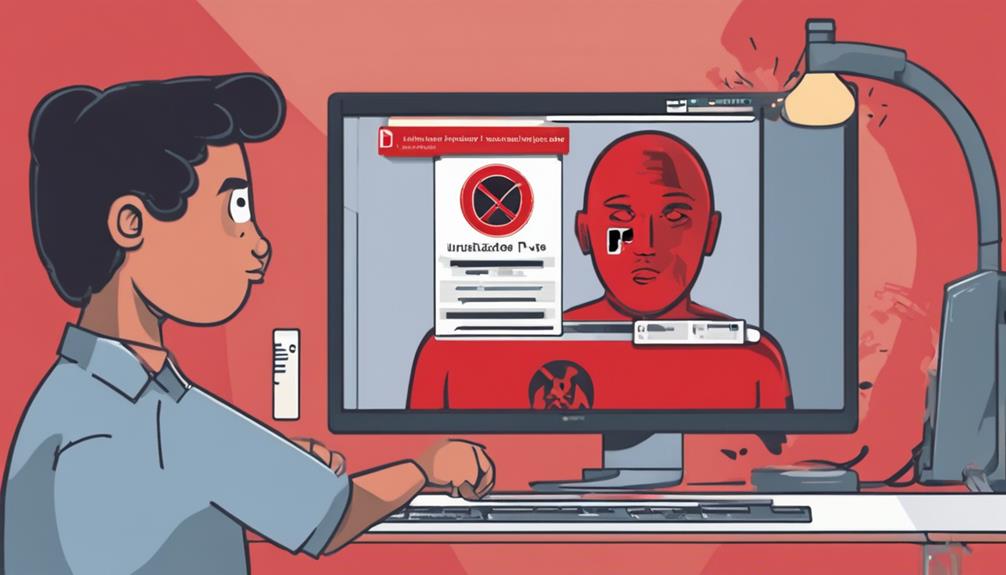Navigating the realm of Disclosure and Barring Service (DBS) checks is a critical aspect of ensuring legal compliance and safeguarding against potential liabilities. Understanding the intricacies of authorized versus unauthorized checks can significantly impact both individuals and organizations.
By exploring the nuances of eligibility criteria, consequences of improper requests, and avenues for recourse, a comprehensive understanding of this topic is essential in today's regulatory landscape.
As we delve deeper into how unauthorized DBS checks can lead to legal trouble, a clearer picture emerges of the complexities involved in maintaining compliance and upholding privacy rights.
Key Takeaways
- Severe legal repercussions for unauthorized DBS checks under the Police Act 1997.
- Importance of truthfulness and accuracy to avoid criminal offenses.
- Employer responsibilities include adherence to Police Act 1997 guidelines.
- Safeguarding personal integrity and privacy rights crucial in challenging unauthorized checks.
Legal Consequences of Unauthorized DBS Checks
Unauthorized DBS checks can result in severe legal consequences, including potential criminal offenses under the Police Act 1997 for making false statements. The repercussions for individuals or organizations submitting inaccurate information for Disclosure and Barring Service (DBS) checks are significant. The Police Act 1997 clearly outlines the legal framework within which these background checks must be conducted, emphasizing the importance of truthfulness and accuracy in the information provided.
Failure to adhere to the guidelines set forth in the Police Act 1997 can lead to criminal charges, tarnishing reputations and potentially impacting future employment opportunities. It is crucial for all parties involved in the DBS checking process to understand and follow the regulations to avoid legal ramifications. By ensuring that only truthful and relevant information is submitted for DBS checks, individuals and organizations can protect themselves from falling afoul of the law.
Ramifications for Employers
Employers who fail to adhere to the legal requirements surrounding DBS checks may face significant repercussions, including potential breaches of the Police Act 1997. Requesting unauthorized checks or providing false information to obtain unnecessary DBS checks can lead to criminal offenses. Moreover, failure to comply with DBS regulations and codes of practice may result in the refusal to issue DBS certificates to employers.
Organizations that persistently submit ineligible DBS applications risk facing legal actions and potential deregistration. Complaints can be lodged against employers who do not follow proper DBS check procedures, potentially involving regulatory bodies like the Information Commissioner's Office.
It is crucial for employers to understand and abide by the rules governing DBS checks to avoid these severe ramifications. Failure to do so can not only harm the organization's reputation but also result in legal consequences that could have long-lasting effects on the business.
Impact on Individual Rights
Unauthorized DBS checks have the potential to infringe on individuals' privacy rights, as they may disclose unnecessary or inaccurate information. Challenging these checks is crucial in ensuring that only legally required data is revealed, protecting individuals from unjust scrutiny.
The impact of unauthorized DBS checks can extend to job offer withdrawals, underscoring the importance of safeguarding individuals' rights and reputations.
Privacy Concerns Addressed
The protection of individual privacy in the context of DBS checks is essential to safeguarding personal integrity and ensuring fair treatment. Unauthorized DBS checks can pose significant privacy concerns, impacting individuals in various ways:
- Disclosure of unnecessary or inaccurate information: Unauthorized checks may reveal details that are irrelevant to the specific purpose of the check, potentially harming an individual's reputation unjustly.
- Challenging unauthorized checks: Individuals have the right to challenge unauthorized DBS checks to prevent unwarranted disclosure of spent convictions or irrelevant information, thereby protecting their privacy rights.
- Preventing discrimination and unfair treatment: Challenging unauthorized checks is crucial in avoiding potential discrimination or unfair treatment based on incorrect or unlawfully obtained information.
Legal Repercussions Potential
Infringing upon the proper authorization processes for DBS checks can lead individuals to face legal repercussions with potential impacts on their rights and obligations. Unauthorized DBS checks may result in breaching the Police Act 1997, especially for making false statements during the process. Moreover, obtaining a DBS certificate under false pretenses is a serious offense that carries legal consequences. Individuals engaging in unauthorized DBS checks also risk facing implications under the Rehabilitation of Offenders Act 1974. Breaching DBS check regulations can lead to legal obligations and penalties, particularly for providing inaccurate information on applications. It is crucial to adhere to proper authorization processes to avoid such legal violations.
| Legal Repercussions Potential | Impact on Individual Rights | Potential Consequences |
|---|---|---|
| Breach of Police Act 1997 for false statements | Loss of privacy rights | Legal penalties |
| Obtaining DBS certificate deceitfully | Infringement on personal rights | Criminal charges |
| Implications under Rehabilitation of Offenders Act 1974 | Limited job opportunities | Reputational damage |
| Penalties for inaccurate statements in applications | Denial of certain privileges | Fines and sanctions |
| Violations for improper DBS check procedures | Legal obligations | Prosecution and legal action |
Rights Protection Paramount
Protection of individual rights is paramount when considering the impact of unauthorized DBS checks. Unauthorized checks can infringe on fundamental rights, leading to legal complications and breaches of data protection laws. To safeguard individual rights in this context:
- Privacy Violation: Unauthorized DBS checks can compromise an individual's right to privacy and confidentiality.
- Questioning Necessity: Individuals have the right to question the necessity of a DBS check for their specific role, ensuring that their privacy is not unjustly invaded.
- Legal Consequences: Requesting unnecessary DBS checks can result in legal repercussions and violations of data protection regulations, emphasizing the importance of respecting individuals' rights in the process.
Regulatory Responses to Unauthorized Checks
Organizations that fail to comply with DBS regulations regarding authorized checks may face regulatory responses aimed at ensuring accountability and preventing future infractions. DBS takes proactive measures to educate organizations on the importance of adhering to proper procedures, and persistent offenders may risk being deregistered.
Complaints regarding unauthorized DBS checks should be formally lodged with the appropriate authorities, with the Information Commissioner's Office (ICO) responsible for addressing such grievances rather than the Ministry of Justice. While the Ministry of Justice oversees DBS policy, individual breaches of unauthorized checks are not within their investigative scope.
It is crucial to understand that unauthorized actions, including conducting improper DBS checks, carry significant legal consequences and may even lead to criminal charges. Therefore, organizations must prioritize compliance with DBS regulations to avoid facing regulatory sanctions and potential legal repercussions.
Steps for Challenging Ineligible Checks
When faced with the challenge of ineligible DBS checks, individuals must first verify the necessity of the check for the specific role before proceeding with the process. It is crucial to ensure that the information being requested aligns with the requirements of the position in question.
Here are three essential steps for challenging ineligible checks:
- Assess the Legal Requirement: Determine whether disclosing any cautions or convictions is a legal obligation for the role being applied for. If not legally required, question the necessity of those details being included in the check.
- Suspect Incorrect Information: If you suspect that the information being checked is incorrect or inaccurate, hold off on providing any additional details until the situation is clarified. It is essential to confirm the accuracy of the data being used in the check.
- Provide Consent with Caution: Even if you believe the DBS check is ineligible or unnecessary, provide consent to avoid potential legal issues. However, if you are confident the check is incorrect, be prepared to challenge its eligibility through the appropriate channels.
Recourse Through Official Channels
When faced with unauthorized DBS checks, individuals have legal options available to challenge the inaccuracies. Seeking official assistance through the DBS can provide guidance on the proper reporting procedures to rectify any incorrect checks.
Utilizing the recourse through official channels ensures that only legally required information is disclosed, safeguarding privacy and maintaining the integrity of background checks.
Legal Options Available
Individuals who have undergone unauthorized DBS checks have legal options available to address the issue through official channels. When facing this situation, they can consider the following actions:
- Challenge the unauthorized DBS check directly through the Disclosure and Barring Service (DBS) if necessary.
- Lodge a complaint regarding the unauthorized check with the Information Commissioner's Office (ICO) for further investigation.
- Organizations repeatedly submitting ineligible applications may face repercussions from the relevant authorities for their actions.
It is essential for individuals to be aware of these legal options and take appropriate steps to address any unauthorized DBS checks they may have experienced.
Seeking Official Assistance
To address instances of unauthorized DBS checks, individuals should seek official assistance through established channels such as the Disclosure and Barring Service (DBS). The DBS can offer guidance on how to challenge and rectify incorrect or unauthorized checks, providing support throughout the process.
By utilizing these official channels, concerns and discrepancies with the DBS check processes can be effectively addressed. Moreover, the DBS has the authority to investigate and take action against organizations that persistently submit unauthorized applications, ensuring compliance with regulations.
In the event of unresolved issues, complaints regarding unauthorized DBS checks can be escalated to the Information Commissioner's Office (ICO) for further handling, safeguarding individuals' rights and privacy.
Proper Reporting Procedures
Reporting unauthorized DBS checks through official channels is essential for addressing breaches of legal requirements and ensuring accountability and compliance with DBS regulations. Proper reporting procedures offer a structured approach to address concerns and seek resolution for unauthorized DBS checks.
When unauthorized checks are reported through official channels:
- The integrity of the recruitment process is maintained, safeguarding individuals' rights.
- Corrective actions can be taken promptly to prevent future unauthorized checks.
- Legal consequences resulting from unauthorized DBS checks can be mitigated through timely and proper reporting procedures.
Potential Complications and Resolutions
Experiencing complications due to unauthorized DBS checks necessitates prompt resolution to mitigate potential legal ramifications and ensure regulatory compliance. Unauthorized requests for Disclosure and Barring Service (DBS) checks can lead to legal trouble, as it is against the law to seek checks that are not mandated.
Failure to adhere to DBS check regulations may result in the DBS refusing to issue a certificate. To prevent legal violations and consequences, it is crucial to understand and follow the proper procedures for DBS checks diligently. Compliance with the law is paramount to avoid legal implications.
Safeguarding against unauthorized DBS check requests is essential not only to prevent legal trouble but also to maintain legal compliance. Resolving any issues promptly and implementing corrective measures can help rectify unauthorized DBS checks and prevent further complications.
Conclusion
In conclusion, unauthorized DBS checks can have serious legal consequences for both employers and individuals, including potential privacy breaches and regulatory violations. It is crucial to follow proper procedures and ensure eligibility before requesting a DBS check to avoid legal trouble.
In cases of unauthorized checks, individuals can challenge them through official channels to seek recourse and resolution. Compliance with DBS regulations is essential to protect privacy rights and maintain legal integrity in recruitment processes.



